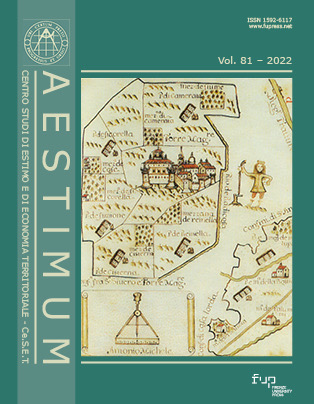Published 2023-02-13
Keywords
- Land values,
- Equity,
- Tax policy
Copyright (c) 2023 Martina Agosta, Caterina Patrizia Di Franco, Emanuele Schimmenti, Antonio Asciuto

This work is licensed under a Creative Commons Attribution 4.0 International License.
Abstract
The Land Cadastre, as an inventory of all relevant real estate in a territory, and most importantly, as a national tax system is, or at least should be, the protagonist of fiscal, social and civil implications affecting the Italian context. According to unitary farmland incomes, the last revision dates back to 1978-1979, a period that no longer reflects the country’s current socioeconomic situation and does not consider the changes the land market has undergone over the years. Through the analysis of 183 purchases and sales of agricultural land in two districts in western Sicily, this research aims at verifying the adequacy or inadequacy of the current cadastral tariffs. Based on the prices surveyed and the cadastral farmland incomes, some indicators were constructed showing, on the one hand the absence of a strict correspondence between these two values and on the other hand the actual presence of fiscal inequality for all the crop qualities examined; and, consequently, the need for revising cadastral tariffs or for reforming tax system of Italian Cadastre by replacing tariffs with market values.






